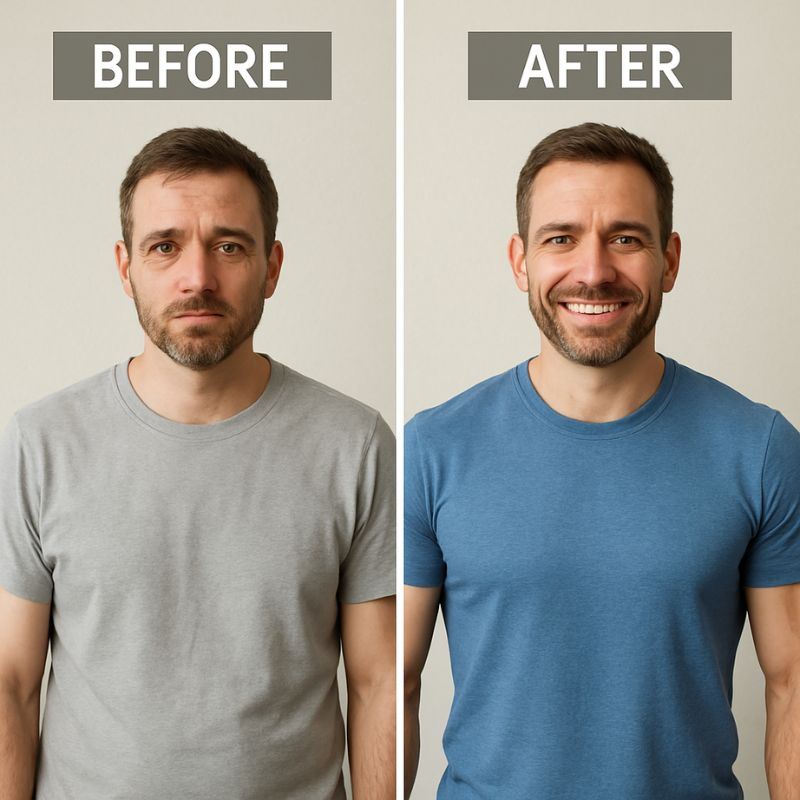
Can Semaglutide Cause Joint Pain? Your Questions Answered by Enhanced Aesthetics & Wellness
Can Semaglutide cause joint pain? Find out from Enhanced Aesthetics & Wellness and get the best treatment options. Call us today.
Home » What Is Testosterone Therapy? Signs You Might Need It

Do you feel constantly fatigued, struggle with low libido, or notice your mood and motivation slipping? These could be signs of low testosterone, a condition affecting millions of men. Testosterone Therapy offers a solution by restoring optimal hormone levels, helping you regain energy, confidence, and overall well-being. In this article, we’ll explore what testosterone therapy is, the signs you might need it, the benefits, and what to expect from treatment.
Whether you’re dealing with subtle changes or more pronounced symptoms, understanding testosterone therapy is the first step toward reclaiming your health and vitality. Keep reading to learn how this therapy can help you feel like yourself again.
Testosterone Therapy is a medical treatment designed to restore low testosterone levels in men. Testosterone is a vital hormone responsible for maintaining energy, mood, muscle mass, sexual function, and overall health. When levels decline naturally with age or due to medical conditions, symptoms such as fatigue, low libido, and reduced mental clarity may appear. Testosterone therapy works by supplementing or restoring these hormone levels, helping the body function optimally.
There are several ways testosterone therapy can be administered, each with specific benefits:
Choosing the right form depends on lifestyle, preference, and your doctor’s recommendation.
Testosterone plays a critical role in metabolism, fat distribution, and energy production. Men with low testosterone often notice decreased stamina, difficulty maintaining weight, and slower metabolism. Restoring testosterone through therapy can help improve energy levels, support healthy metabolism, and assist in weight management.
Beyond physical health, testosterone is essential for mental well-being. Low levels can lead to irritability, depression, anxiety, and decreased motivation. Testosterone therapy may enhance mood, improve focus, and increase mental clarity, helping men feel sharper and more emotionally balanced.
Testosterone supports muscle growth, strength, and bone density. Men with low testosterone may experience muscle loss, decreased strength, and a higher risk of osteoporosis. Therapy can help preserve lean muscle, enhance physical performance, and maintain bone health, reducing the risk of fractures and injuries.
If you feel drained even after adequate rest, struggle with daily activities, or find your stamina has dropped, low testosterone could be the cause. Testosterone therapy helps restore energy levels, allowing you to engage in work, exercise, and daily life with renewed vigor.
Testosterone is vital for sexual desire and function. Men with low testosterone often experience a decrease in libido, difficulty achieving erections, or reduced sexual satisfaction. Therapy can help improve sexual health, restoring intimacy and confidence.
Persistent irritability, anxiety, or depressive symptoms may indicate low testosterone. These emotional changes can affect relationships and quality of life. Testosterone therapy may stabilize mood, improve emotional resilience, and enhance overall mental well-being.
Men with declining testosterone often notice increased body fat, particularly around the abdomen, and decreased muscle mass. Testosterone therapy can support fat loss, improve muscle tone, and optimize body composition, complementing diet and exercise.
One of the most immediate benefits of testosterone therapy is restored energy. Men report feeling more alert, active, and motivated to engage in work and recreational activities, reducing feelings of fatigue.
Testosterone therapy can improve mental sharpness, focus, and emotional stability. Patients often notice less irritability, greater confidence, and a more positive outlook on daily life.
Therapy helps build lean muscle, increase strength, and maintain bone density, lowering the risk of injuries and enhancing physical performance. Over time, these changes contribute to a stronger, more resilient body.
Testosterone therapy can restore libido, improve erectile function, and enhance sexual satisfaction. Men often experience a renewed sense of intimacy and confidence in their relationships.
Your doctor will perform blood tests to measure testosterone levels and assess overall health. This evaluation ensures therapy is appropriate and safe for your individual needs.
Depending on the form chosen, therapy may involve regular injections, daily gels, patches, or pellet implantation. Most men notice improvements in energy, mood, and libido within a few weeks, while muscle and bone benefits may take several months.
Testosterone therapy is generally safe when monitored by a healthcare professional. Common side effects may include mild acne, fluid retention, or changes in cholesterol levels. Regular follow-ups and lab tests help minimize risks and ensure optimal results.
Eat a balanced diet rich in lean proteins, healthy fats, and nutrient-dense vegetables. Foods like eggs, nuts, and leafy greens support natural testosterone production and overall health.
Strength training and high-intensity interval training (HIIT) help maintain muscle mass, boost energy, and improve hormone balance. Consistent physical activity enhances the benefits of testosterone therapy.
Quality sleep and stress reduction are critical for hormone balance. Aim for 7–9 hours of sleep per night and incorporate relaxation techniques such as meditation, deep breathing, or yoga.
Testosterone Therapy is a safe and effective treatment for men experiencing fatigue, low libido, mood changes, and decreased muscle mass due to low testosterone levels. By restoring hormones to their optimal levels, therapy can improve energy, mood, sexual health, and overall quality of life.
If you recognize any signs of low testosterone, don’t wait. Contact Enhanced Aesthetics & Wellness in Pahrump, NV at (775) 877-9500 or schedule a consultation online to discuss how testosterone therapy can help you feel like yourself again. Book your appointment here: https://ae.myaestheticrecord.com/login. Check our reviews to see real patient experiences: Enhanced Aesthetics & Wellness Google Reviews.
Q: What is testosterone therapy?
A: Testosterone therapy is a medical treatment designed to restore low testosterone levels in men, helping improve energy, mood, sexual function, and overall health.
Q: How do I know if I need testosterone therapy?
A: Signs may include fatigue, low libido, mood changes, weight gain, and decreased muscle mass. A blood test by a qualified healthcare provider can confirm low testosterone levels.
Q: Is testosterone therapy safe?
A: Yes, when prescribed and monitored by a healthcare professional. Side effects are typically mild and include acne, fluid retention, or minor changes in cholesterol.
Q: How long does it take to see results from testosterone therapy?
A: Many men notice improvements in energy, mood, and libido within 3–6 weeks. Muscle and bone improvements may take several months.
Q: Can testosterone therapy help with weight loss?
A: Testosterone therapy can support metabolism, increase muscle mass, and help reduce fat, particularly when combined with diet and exercise.

Can Semaglutide cause joint pain? Find out from Enhanced Aesthetics & Wellness and get the best treatment options. Call us today.

Unlock the science behind a calorie deficit for effective weight loss. Get personalized help at Enhanced Aesthetics & Wellness.